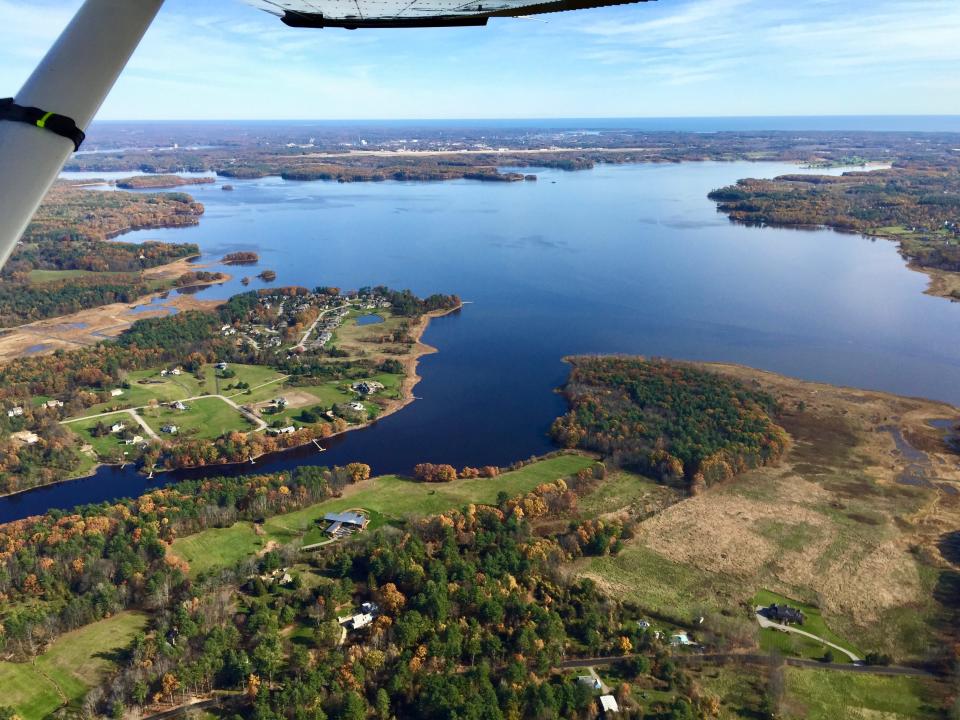Durham, UNH take action on drinking water as Epping sewage in Lamprey River is unsolved
DURHAM — As the town of Epping works to address environmental concerns over failings in how it treats wastewater, the town of Durham and the University of New Hampshire temporarily discontinued use of water from the Lamprey River, one of their prime sources of potable water.
This change occurred Monday, May 8, according to Durham Town Administrator Todd Selig, adding Epping planned to initiate its own bypass process Thursday, May 11. He said the Epping wastewater transfer facility staff and the Durham wastewater treatment facility staff have been in frequent communications and are in agreement to the plan.

"The New Hampshire Department of Environmental Services directed the UNH/Durham water system to be off the Lamprey for both plant and recharge beginning (May 11)," Selig said. "This required our joint town/UNH system to transition slowly to avoid any water quality issues and to balance the plant beginning this past Monday."
Selig went on to explain Durham's water sourcing plan.
"Effective Tuesday evening (May 9) we were no longer recharging and we were on a 100% Oyster River blend," he said. "Beginning (Wednesday) we are on 75% Oyster River and 25% Spruce Hole (well) blend, still with no recharge. Our system will continue to be off the federally designated Wild and Scenic Lamprey River until partially treated wastewater bypassing ceases in Epping, which at this time is unknown. It's a very unfortunate and problematic situation on many levels."
Previous story: Epping sewage endangering Durham drinking water and Lamprey River, officials say
Selig said Durham and UNH water users should understand their water is safe, although the system has lost its resiliency.
"If we have drought conditions this summer, it could be a real challenge," he said. "Not to mention potential environmental concerns Epping's ongoing partially treated wastewater discharge could have for wildlife, the environment, and recreation.
"It is our understanding the town of Durham should be able to stay off of the Lamprey for a considerable amount of time so that once we start, we should be able to continue (24/7), as long as necessary," said Selig.
"We will continue to do that as long as Epping continues surcharging partially treated water into the Lamprey River," said Selig. "Durham has diversified water sources, and we will do what we need to do to assure the town and the university have safe drinking water."
In April, a letter sent by Durham and the University of New Hampshire asked for state and federal help to protect drinking water from Epping's treatment plant, which is upstream from the town.
More local news: Judge OKs plea deal for driver in crash that killed couple. Family cries out for more.
The letter sent April 10, 2023, to the New Hampshire Department of Environmental Services and the Environmental Protection Agency, indicates their concern for the Lamprey River, which town and university officials say is in danger because of Epping's failing wastewater treatment system.
"This danger to the river all stems from Epping having a faulty wastewater treatment plant," said Selig. "They are not operating in compliance with their permits. And the kind of treatment they moved to in 2021 uses untried methods for filter treatment that are not working."
"I don't know how this problem got so severe, but now it is shocking to me that it was allowed to get so bad for so long," said Melissa Paly, Great Bay-Piscataqua waterkeeper for the Conservation Law Foundation, in an earlier interview. "Epping has been aware of this issue for several years, and they know the last two winters this system failed. It is a system they installed that is not designed to work in cold weather. Epping is a fast-growing community, and they need to take responsibility and do what others do, adequately address their wastewater."
A letter to Epping in March, sent by NHDES Commissioner Robert Scott, indicates Epping has had issues with its existing hollow fiber membranes, part of the filtration system for their treatment plant since 2006, and has yet to resolve the problems. The letter says the membranes cannot adequately process wastewater, particularly in cold weather. Excess flow is diverted into two lagoons and as they fill, excess is chlorinated and discharged into the Lamprey River. The chlorination is not sufficient to clean the wastewater.
In December 2022, under an administrative order from NHDES, the Epping Water and Sewer Board developed and approved a wastewater treatment facility corrective action plan (WWTF CAP) to stabilize the process and minimize wastewater bypasses in the intermediate term (0 to 4 years) and provide a permanent treatment solution within four years to meet the town’s long-term wastewater needs.
In a letter dated Sept. 12, 2022, the environmental agency issued a sewage and septic moratorium, disallowing any new connections to the Epping service, in light of "significant operational issues."
Epping Town Administrator Greg Dodge, who will retire in June, previously said the town is working hard to comply with everything being asked by the state DES.
'We have a corrective action plan in place, working with the DES and the EPA," said Dodge. "We know we have some monumental issues, and we are working to correct that. I don't think continuing to penalize the town, assessing more fines will be helpful. We are already facing huge expenses here. We will continue to address the issues."
This article originally appeared on Fosters Daily Democrat: Durham, UNH take action on drinking water amid Epping sewage threat

